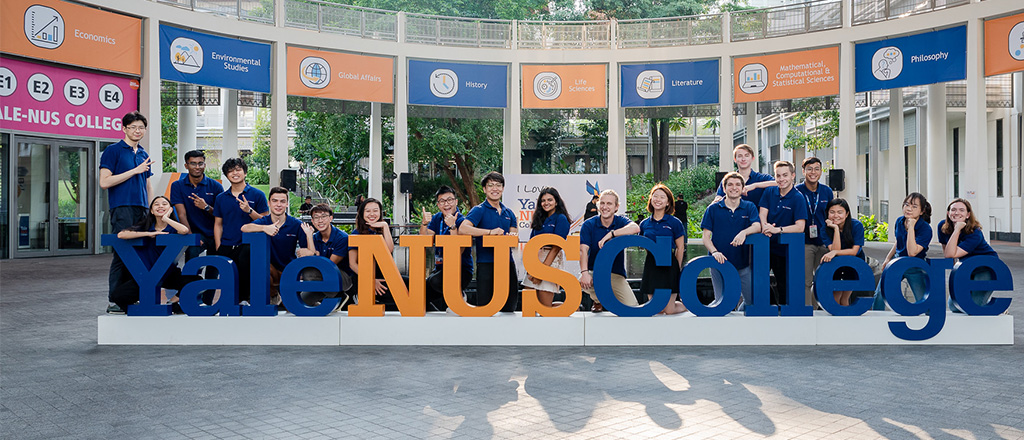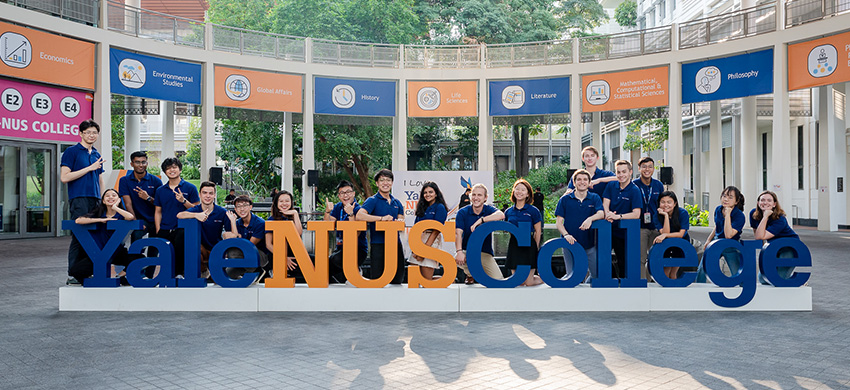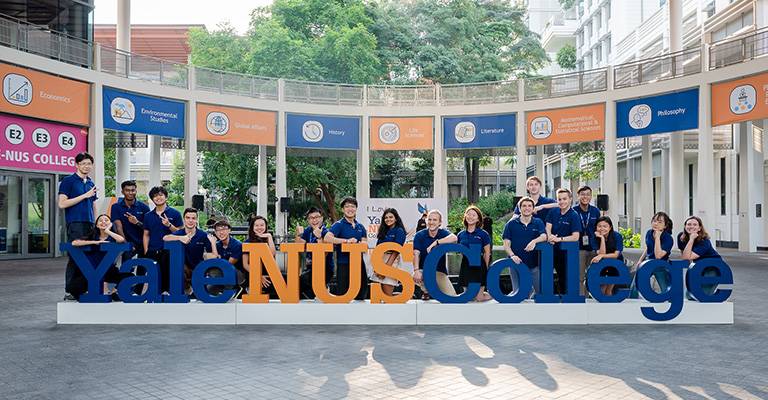The Straits Times (ST) and Lianhe Zaobao (1, 2) published articles about Yale-NUS College in its final year, carrying reflections from Yale-NUS College President Joanne Roberts, students and alumni, who shared their experiences and expressed their gratitude for the unique community and educational opportunities they had experienced.
The pieces noted that Yale-NUS College, which pioneered liberal arts education in Singapore and nurtured over 1500 graduates over 10 years, will officially close in June 2025, after the Class of 2025 graduates. ST noted that alumni and students are working to preserve the legacy of Yale-NUS. Initiatives include art exhibitions, creative writing collections, and a book documenting campus life. Alumni and students also reflected on the value of the liberal arts education provided by Yale-NUS. The college’s interdisciplinary curriculum encouraged critical thinking and open debate, qualities that alumni hope will continue to influence Singapore’s educational landscape. Despite the closure, there is optimism about carrying forward the values of diversity, empathy, and intellectual curiosity fostered at Yale-NUS.
Zaobao’s report also carried President Roberts’ comments about the increased emphasis on interdisciplinary and comprehensive education, residential living and global learning experience in Singapore and globally, which are the concepts that Yale-NUS has been practising. She noted that the characteristics of liberal arts education have been more widely adopted by other local universities, which she believes is the value Yale-NUS has demonstrated.
The Straits Times reported on the research by a Yale-NUS research team about the growing consumption of American eel (Anguilla rostrata). The team examined 327 individual eel products purchased across 86 retailers throughout Singapore, and discovered that the endangered American eel (Anguilla rostrata) is commonly sold for consumption here. This calls for more attention to prevent the species from becoming critically endangered. The paper was published in Conservation Science and Practice.
The news was also reported in The New Paper, VOH Online and science publications such as Phys.org, Science Daily, Bioengineer.org, Earth Press News, Earth.com, Saving Seafood and Technology Networks.
The Straits Times featured a scripted podcast series by Yale-NUS alumnus Roshan Singh Sambhi which will feature direct adaptations of American comic book giant DC’s Batman stories as audio dramas. Roshan is the co-writer, co-producer and assistant director of the podcast series, which will premiere on 2 April 2025. Roshan, who graduated from Yale-NUS College is 2018 with a major in arts and humanities, has been working in New York for the past four years as a creative. Prior to moving to the US, he was a freelance screenwriter in Singapore.
BBC World Service’s The Forum programme interviewed Yale-NUS Associate Professor of Humanities (Literature) and Head of Studies (Literature) Andrew Hui, together with two other experts on the topic of the past, present and future of libraries. Assoc Prof Hui is also author of The Study: The Inner Life of Renaissance Libraries. The episode discussed the purpose of libraries in the era of the internet and AI, whether people need to think differently about the way we access and navigate books, and if well-designed AI tools be trusted to make sense of this information abundance in a similar way that a good librarian can.
NPR’s TED Radio Hour programme featured a talk by Yale-NUS Associate Professor of Science (Life Sciences) Philip Johns who shared that while otters have taken up residence in Singapore, tensions are rising with their human neighbours, but with some effort, these two species can live side-by-side.
Berita Harian and 8world reported that according to the Joint Autonomous Universities Graduate Employment Survey (JAUGES) 2024 released on 25 February, about 86 per cent of Yale-NUS fresh graduates were employed within six months of completing their final examinations, securing jobs in a wide range of industries. The articles reported that the median gross monthly salary of Yale-NUS graduates with a Bachelor of Science (Hons) degree in full-time permanent employment was $5,043, while graduates with a Bachelor of Arts (Hons) degree earned $4,557. The overall median gross monthly salary was $4,786.
The Straits Times featured Yale-NUS alumnus Joshua Tay (Class of 2021), for being nominated for The Straits Times Singaporean of the Year 2024 Award, alongside Narasimman Tivasiha Mani, both co-founders of Impart. The award is given to a Singaporean or group of citizens who have made a significant contribution to society. Impart is a volunteer-driven charity which helps vulnerable young people facing challenges such as mental health struggles, financial difficulties, domestic violence and homelessness. In the article, the duo shared about setting up Impart and their latest initiative to reach out to reclusive youngsters.
CNA featured Thryft, a thrift store started by a group of Yale-NUS schoolmates who recognised the value of secondhand items and wanted to expand on the secondhand market they observed on campus. Founded in 2019, Thryft has expanded from pop-up events on campus to an online database that lists over 40,000 items including books, clothes and vinyl records and a retail store. Two of the co-founders, Eddie Lim and Choy Jia Yu (Class of 2022) spoke about Thryft’s beginnings and how they leverage AI to handle the tedious administrative work that typically bogs down secondhand stores, such as pricing, cataloguing, and inventory management.
MSN reported that Donald Trump’s triumph in the governmental election might spell difficulty for Chinese fast-fashion brand names, especially Gen Z-favorite budget plan brand names like Shein and Temu. He announced recently in a Fact Social post that he means to slap China with an extra 10 per cent import tariff– on top of any tariffs he currently prepares to enforce. David Jacks, J.Y. Pillay Professor of Social Sciences (Economics) at Yale-NUS College said that it was “difficult to think about any situation” where the fast-fashion market “totally leaves restored United States protectionism.” He stated that since their supply chains stem from China, Shein and Temu are “most likely to get even higher examination and suffer greater tariffs” compared to other companies that produce in Bangladesh and Morocco, for instance.
The report was first published in Business Insider and republished in media outlets such as the New York Ledger.
The Straits Times carried a commentary by Visiting Professor Jeannette Ickovics from Yale University and Yale-NUS student May Lee (Class of 2025) on how robots driven by artificial intelligence (AI) can offer promising support for an ageing population. The article discussed the potential benefits and ethical concerns surrounding AI companions. The authors emphasised that while therapy bots can help people express their emotions and apps can help to remind people to take medication, ethical questions about prolonged attachment and data privacy may arise. The authors concluded that integrating AI companions could provide an even more comprehensive solution to the mental health crisis among older adults, and that the goal is not to substitute human care with machines, but to use AI as a supportive tool within a larger system of care.




